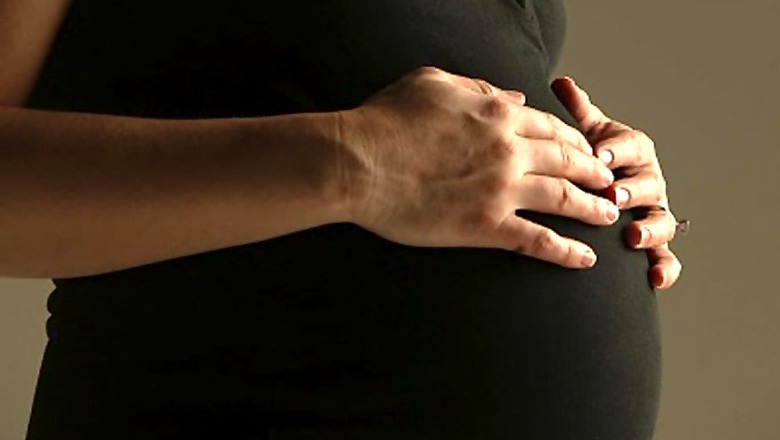
views
New Delhi: Although the Medical Termination of Pregnancy (MTP) Act 1971 — a law that was considered ahead of its times then — had legalised abortion in India up to 20 weeks of pregnancy upon certain conditions, a study reviewing 194 writ petitions in the Supreme Court and the High Court in the past three years found that women were approaching the legal system to abort.
The study, conducted by the Pratigya Campaign for Gender Equality and Safe Abortion, assessed the judicial role in access to safe abortion in India and analysed 194 writ petitions by women before the Supreme Court and High Courts, which sought permission to terminate their pregnancies. Of these 21 cases were filed before the Supreme Court, and 173 filed before the High Courts. The organisation is a network of individuals and organisations working towards protecting and advancing women’s rights and their access to safe abortion care in India
It recommended that the Ministry for Health and Family Welfare issues a statement clarifying that pregnant women aren’t required to approach a court for permission to seek an MTP if the foetus is less than 20 weeks of gestation, that the MTP Amendment Bill, 2014 should be tabled and passed in the parliament with all amendments proposed. It also proposes the addition of a provision to allow abortion in all rape cases, regardless of gestation due to the associated mental and physical trauma and that the Supreme Court should lay down comprehensive jurisprudence that clarifies the act to ensure that the delivery of justice is consistent across states and permit all cases under 20 weeks.
A recent study published in the Lancet Global Health noted that in 2015, 15.6 million abortions occurred in India, out of which 78% were outside health facilities. It noted that although abortion was legalised in India 50 years ago, 10 women die every year due to unsafe abortions, making it the third-leading cause of maternal deaths in the country.
Of these 173, medical termination of pregnancy (MTP) were allowed in 139 cases, and denied in 29 cases, while the rest were withdrawn. A total of 40 women who petitioned the High Courts, the study found, were below 20 weeks of gestation and of these several were cases of rape. The report noted that in the cases of rape, where permission was rejected, the reasons were “varied”. It noted, “The court relied primarily on the opinion of the medical board. Notably, medical boards do not follow a consistent set of parameters on the basis of which they offer advice, leading to inconsistencies.” It also noted the case of a minor who was raped, where the medical exam was conducted in the 19th week of the pregnancy, but the MTP wasn’t carried out, resulting in a petition to the HC. It added, “The High Court noted this lapse, but denied the MTP since the foetus was over 20 weeks.”
Of the cases petitioned before the Supreme Court that involved over 20 weeks of gestation, 5 were cases of rape and 15 involved foetal abnormalities. “The Supreme Court denied five cases and permitted 15 MTP requests. Among the five cases denied by the court, three involved foetal abnormalities, where each case had a foetus between 26-28 weeks gestation. The Supreme Court followed the opinion of the medical boards, set up to examine the woman, to decide the judgement in these cases,” said a statement.
The study also found that 73 petitioners knocked on High Courts’ door to seek permission for MTP, citing potential foetal abnormalities. “Out of these, the courts allowed 63 requests and turned down 10. Out of the 73 petitions, 62 involved foetuses with gestation beyond 20 weeks. Most of these abnormalities are detectable only after the 20-week gestation period, leaving women no choice but to reach out to the court for permission to abort,” added the statement. The report also noted that the judiciary tends to rely on court-appointed medical boards to make a judgement, which often examines the women from scratch while ignoring the opinions of the doctors that the women had consulted.
VS Chandrashekar, Pratigya Campaign Advisory Group Member and Chief Executive Officer, Foundation for Reproductive Health Services India said, "The study clearly shows that women with pregnancies even below 20 weeks gestation are going to the court to seek permission for MTP. These cases clearly defy the provisions of the MTP Act and represent major problems in the access to abortion. These women have to further face a long and tiring process, where they are subject to examination before the medical boards, despite having consulted their own providers. The entire process adds to the trauma for women and girls and is a violation of their rights. "
Anubha Rastogi, Pratigya Campaign Advisory Group Member and Independent Lawyer, said,” Till the time the amendments are passed by the Parliament, the Judiciary should lay down comprehensive guidelines that keep the woman and her wellbeing at the centre of any decision-making on permission for MTP. Attention should be paid to the woman's wellbeing and her circumstances, which include her financial capacity to raise a child, the mental trauma of having to carry an unintended pregnancy to term, and capacity to raise a child with special needs."




















Comments
0 comment